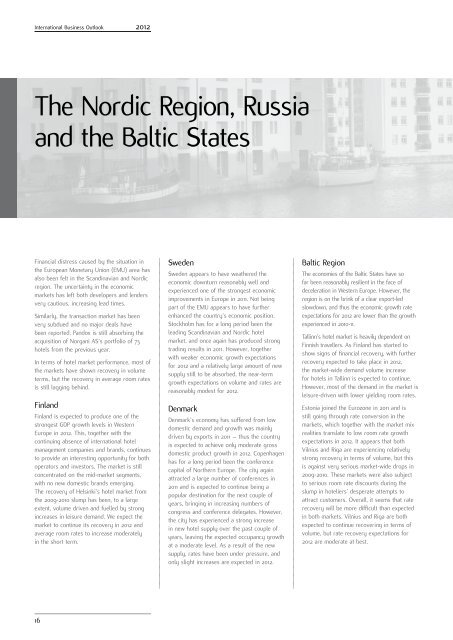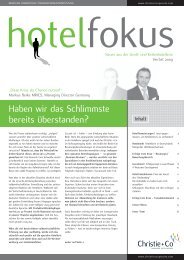Case Studies - Christie + Co
Case Studies - Christie + Co
Case Studies - Christie + Co
Create successful ePaper yourself
Turn your PDF publications into a flip-book with our unique Google optimized e-Paper software.
International Business Outlook 2012<br />
The Nordic Region, Russia<br />
and the Baltic States<br />
Financial distress caused by the situation in<br />
the European Monetary Union (EMU) area has<br />
also been felt in the Scandinavian and Nordic<br />
region. The uncertainty in the economic<br />
markets has left both developers and lenders<br />
very cautious, increasing lead times.<br />
Similarly, the transaction market has been<br />
very subdued and no major deals have<br />
been reported. Pandox is still absorbing the<br />
acquisition of Norgani AS’s portfolio of 73<br />
hotels from the previous year.<br />
In terms of hotel market performance, most of<br />
the markets have shown recovery in volume<br />
terms, but the recovery in average room rates<br />
is still lagging behind.<br />
Finland<br />
Finland is expected to produce one of the<br />
strongest GDP growth levels in Western<br />
Europe in 2012. This, together with the<br />
continuing absence of international hotel<br />
management companies and brands, continues<br />
to provide an interesting opportunity for both<br />
operators and investors. The market is still<br />
concentrated on the mid-market segments,<br />
with no new domestic brands emerging.<br />
The recovery of Helsinki’s hotel market from<br />
the 2009-2010 slump has been, to a large<br />
extent, volume driven and fuelled by strong<br />
increases in leisure demand. We expect the<br />
market to continue its recovery in 2012 and<br />
average room rates to increase moderately<br />
in the short term.<br />
16<br />
Sweden<br />
Sweden appears to have weathered the<br />
economic downturn reasonably well and<br />
experienced one of the strongest economic<br />
improvements in Europe in 2011. Not being<br />
part of the EMU appears to have further<br />
enhanced the country’s economic position.<br />
Stockholm has for a long period been the<br />
leading Scandinavian and Nordic hotel<br />
market, and once again has produced strong<br />
trading results in 2011. However, together<br />
with weaker economic growth expectations<br />
for 2012 and a relatively large amount of new<br />
supply still to be absorbed, the near-term<br />
growth expectations on volume and rates are<br />
reasonably modest for 2012.<br />
Denmark<br />
Denmark’s economy has suffered from low<br />
domestic demand and growth was mainly<br />
driven by exports in 2011 – thus the country<br />
is expected to achieve only moderate gross<br />
domestic product growth in 2012. <strong>Co</strong>penhagen<br />
has for a long period been the conference<br />
capital of Northern Europe. The city again<br />
attracted a large number of conferences in<br />
2011 and is expected to continue being a<br />
popular destination for the next couple of<br />
years, bringing in increasing numbers of<br />
congress and conference delegates. However,<br />
the city has experienced a strong increase<br />
in new hotel supply over the past couple of<br />
years, leaving the expected occupancy growth<br />
at a moderate level. As a result of the new<br />
supply, rates have been under pressure, and<br />
only slight increases are expected in 2012.<br />
Baltic Region<br />
The economies of the Baltic States have so<br />
far been reasonably resilient in the face of<br />
deceleration in Western Europe. However, the<br />
region is on the brink of a clear export-led<br />
slowdown, and thus the economic growth rate<br />
expectations for 2012 are lower than the growth<br />
experienced in 2010-11.<br />
Tallinn’s hotel market is heavily dependent on<br />
Finnish travellers. As Finland has started to<br />
show signs of financial recovery, with further<br />
recovery expected to take place in 2012,<br />
the market-wide demand volume increase<br />
for hotels in Tallinn is expected to continue.<br />
However, most of the demand in the market is<br />
leisure-driven with lower yielding room rates.<br />
Estonia joined the Eurozone in 2011 and is<br />
still going through rate conversion in the<br />
markets, which together with the market mix<br />
realities translate to low room rate growth<br />
expectations in 2012. It appears that both<br />
Vilnius and Riga are experiencing relatively<br />
strong recovery in terms of volume, but this<br />
is against very serious market-wide drops in<br />
2009-2010. These markets were also subject<br />
to serious room rate discounts during the<br />
slump in hoteliers’ desperate attempts to<br />
attract customers. Overall, it seems that rate<br />
recovery will be more difficult than expected<br />
in both markets. Vilnius and Riga are both<br />
expected to continue recovering in terms of<br />
volume, but rate recovery expectations for<br />
2012 are moderate at best.






